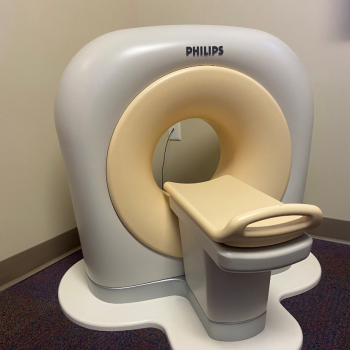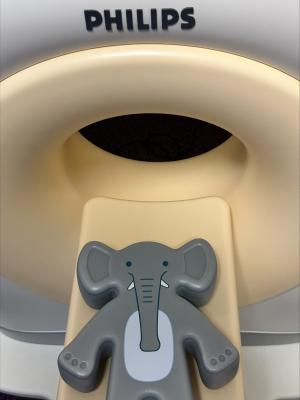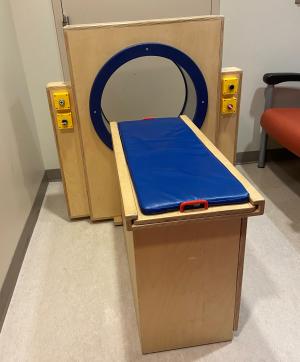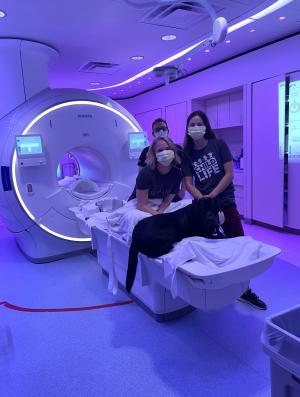
Undergoing an MRI or CT scan, also known as a CAT scan, can be stressful for kids. They may hear sounds or be in a room they haven’t seen before.
Phoenix Children’s has tools to help make scans less intimidating.
One of those tools is the Kitten Scanner, courtesy of Philips, that was recently introduced to the Phoenix Children’s Radiology Department. The 3-foot-high mini replica of a CT scan (or CAT scan) is one of the latest resources Phoenix Children’s uses to provide patients with a positive experience.
“The goal of the scanner is to reduce kids’ fears, make them more comfortable and help them understand what is going to happen and show them the importance of holding still during a scan,” said Robert Valverde, lead MRI technologist at Phoenix Children’s. “We’re trying to help kids go through the process without needing anesthesia.”
Kids can scan a crocodile, elephant and more

Children can practice their scan with the choice of four “patients,” Ollie Elephant, Chris Crocodile, Robert Robot and Doris Chicken. Each character has its own story geared toward children ages 3 to 9 explaining why they need a scan.
Kids can place the character on the scanner’s bed and slide it into the donut-shaped device. Then, the computer reads a small chip inside the toy to give children an understanding of what is happening inside their patient’s body.
“A short animation on a screen mounted on the wall shows kids the scan of the toy and tells them a story about what has been discovered,” Valverde said. “For example, Ollie has a bellyache. The child places the elephant on the scanner, slides it into the machine, and the screen shows fish inside the elephant’s stomach.”
When children use the Kitten Scanner, they can gain a sense of control by teaching the character what is happening, step-by-step, reinforcing what will occur during their own scan. In addition, it allows them to exercise choice for the characters, such as, “Does Ollie want to sit up or lay down when he falls asleep? Does he want to hold hands, or does Ollie want to watch something on a tablet?”
These choices can help the child think about how they want to prepare for their own scan.
Child life specialists say that using repetition helps kids get the hang of it. Once young patients know what to expect, they do much better.
Other prep tools to ease ‘scanxiety’

Other tools at patients' and families’ disposal are a mock scanner, educational resources and patient-friendly scan suites. Near the mock scanner, there is also a wooden model of an MRI scanner that is large enough for small children to lie on and practice staying still.
There are child-friendly prep books in both English and Spanish available for families to familiarize kids with why scans are needed, what they will hear and what the machine will look like. There is also a downloadable Simply Sayin’ app, created by the Child Life team at Phoenix Children’s, that uses developmentally-appropriate language explaining scans or other treatments.
To create a more calming, ambient experience, some MRI suites are equipped with music and sound effects to help ease ‘scanxiety.’ Sometimes, kids can watch a movie during their scan as well.

Gertie, a facility dog at Phoenix Children’s, works throughout the hospital with her handler Rachel, a child life specialist, to help patients achieve treatment goals, cope with a new diagnosis or prepare for a procedure. Gertie has been specially trained to lay on the MRI table and can even go into the scanner to help ease a patient’s pre-scan worries.
These things may be available depending on the type of scan needed. Ask your MRI technologist what choices are available to you.
The benefits of these tools are clinical and emotional. When young patients are calmer and more cooperative, the care team can get better images, reducing the need for repeat scans and sedation.
Learn more
If your child requires imaging services, you can count on Phoenix Children’s to provide safe, high-quality images.
For more information, call 602-933-1215 or click here.
